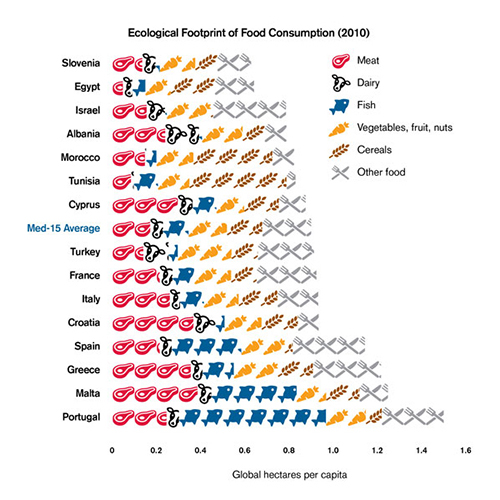#MoveTheDate
If we replaced 50% of global meat consumption with plant-based substitutes, we would move Overshoot Day 7 days, from CO2 and land-use alone. (If we include methane emissions, the impact is even greater.)
What is the solution?
Shift towards a plant-based diet and reduce consumption of animal protein by replacing it with plant-based proteins.
This solution improves our resource security in the food category.
How does it #MoveTheDate?
Meat production is highly inefficient in terms of the energy, space, and feed it requires. Beef, in particular, requires 25kg of grain and roughly 15,000 liters of water per kilogram produced. Reducing meat consumption means fewer resources are needed to produce the same number of calories of food.
How is it scalable?
Meat consumption across the world, especially in high income countries, has increased significantly over the past few decades. Reversing this trend and returning to more traditional diets is largely possible. New plant-based protein products make it easier than ever to reduce meat consumption.
What is the solution?
Shift towards a plant-based diet and reduce consumption of animal protein by replacing it with plant-based proteins.
This solution improves our resource security in the food category.
How does it #MoveTheDate?
Meat production is highly inefficient in terms of the energy, space, and feed it requires. Beef, in particular, requires 25kg of grain and roughly 15,000 liters of water per kilogram produced. Reducing meat consumption means fewer resources are needed to produce the same number of calories of food.
How is it scalable?
Meat consumption across the world, especially in high income countries, has increased significantly over the past few decades. Reversing this trend and returning to more traditional diets is largely possible. New plant-based protein products make it easier than ever to reduce meat consumption.
In partnership with Barilla Center for Food and Nutrition, Global Footprint Network’s assessment of the Ecological Footprint of various foods highlights this overarching pattern: generally, the healthier the food, the lower its ecological impact. A nutritionally balanced, vegetarian diet boasts an Ecological Footprint that is 2.5 times lower than that of one composed mainly of animal-based proteins. Therefore, foods that should make up a larger part of our diet are also those with lower Footprints. The tasty traditional Mediterranean diet fits the bill perfectly: lots of fresh vegetables, grains, olive oil, and low amounts of animal products.
There is much discussion about the impact of beef, in particular. While in some grasslands, well-managed cattle grazing can be ecologically highly beneficial, the current volume of beef consumption exceeds what can be produced in ecologically sensitive and beneficial ways. Jon Foley provides a great summary for beef consumption in the US and explains why less is more.
Learn more about Food-based solutions here.
Global Footprint Network gratefully acknowledges the generous support of Avina Stiftung for Earth Overshoot Day in general and the food dimension in particular.
There’s no benefit in waiting!
Acting now puts you at a strategic advantage in a world increasingly defined by ecological overshoot. Countless solutions exist that #MoveTheDate. They’re creative, economically viable, and ready to deploy at scale. With them, we can make ourselves more resilient and #MoveTheDate of Earth Overshoot Day. If we move the date 6 days each year, humanity can be out of overshoot before 2050.

